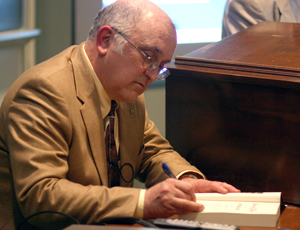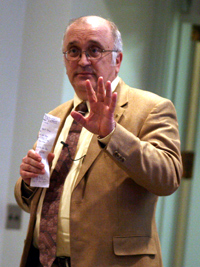Negro League baseball and even plantation games long pre-dated 1947 when Jackie Robinson broke the color barrier in Major League Baseball. Historian Lawrence Hogan told a Wabash College audience Thursday black baseball has been around since the game’s beginning.
 Hogan, a professor of history at Union County College at Cranford, New Jersey, not only has studied the history of black baseball but has helped vote members of the Negro Leagues into Cooperstown’s Baseball Hall of Fame.
Hogan, a professor of history at Union County College at Cranford, New Jersey, not only has studied the history of black baseball but has helped vote members of the Negro Leagues into Cooperstown’s Baseball Hall of Fame.
While popular history focuses on Robinson’s achievement, the best trivia buffs know the color barrier was broken long before the Dodgers signed the future Hall of Famer.
Moses Fleetwood Walker played briefly for a team in Toledo in 1887, along with another black man, before they were effectively booted from the game.
African-American men played baseball back into the 1860s and the game prospered following the migration north of African-Americans in the late 1800s and early 1900s. The first professional Negro Leagues formed around 1920 and lasted until the Depression. Negro Leagues flourished again after the Depression until Robinson’s break into the major leagues.
Hogan suggested the black pioneers were not just playing baseball but were part of a civil rights movement long before the 1960s. "When someone does something so well in the public arena, they’re making a statement," he said. Many of the early black players of the Babe Ruth era are recognized as the equals or even better players than many who were in the major leagues.
 When Robinson, Hank Aaron, and Roy Campanella, among others, joined the major leagues they were immediately successful. "They came up and played so well because they were professional baseball players," Hogan said. "That (Negro Leagues) is where they learned their skills."
When Robinson, Hank Aaron, and Roy Campanella, among others, joined the major leagues they were immediately successful. "They came up and played so well because they were professional baseball players," Hogan said. "That (Negro Leagues) is where they learned their skills."
Hogan and other historians call their mission one of public education. Despite the 2006 induction of 17 Negro League-era players and officials added to the Hall, there is no mechanism for future inclusion.
Many of the Negro League players are now advanced in years, but Hogan marvels at their lack of bitterness for being shut out of major league baseball or being denied an opportunity in the late 40s because there were unofficial quota systems in the majors.
Still, they all have great respect for what Jackie Robinson accomplished. "They harbor no malice at all," Hogan said of the Negro League players and Robinson. "They knew Jackie was the right guy to do it. They knew he had the right stuff off the field to do it. But to a man they’d also tell you ‘we had better players.’ "
In photos: Top left, Hogan signs copies of his book "Shades of Glory." At right, he makes a point during his lecture. On homepage, Josh Chatman '10 models a Negro League era baseball uniform.